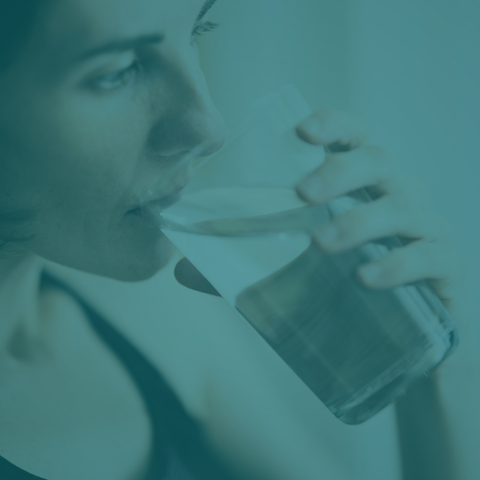
Creatine is one of the most highly researched and widely used dietary supplements in sport and exercise nutrition [1,2].
Primarily recognized for its role in enhancing high‑intensity exercise performance and supporting the development of muscle mass, creatine also exerts notable effects on the body's water balance.
Understanding how creatine influences hydration is essential for athletes, coaches, and recreational lifters aiming to maximize performance without compromising fluid balance.
This article delves into the underlying mechanisms of creatine‑induced fluid shifts, examines changes in total body water and compartmental distribution, addresses safety considerations during exercise and heat stress, dispels some common myths, and provides practical hydration strategies for optimal results.
How does creatine work, and why is it used?
Creatine supplementation is very popular in the fitness community and has been for decades.
It is a naturally occurring compound that is found predominantly in muscle tissue [3] with smaller amounts elsewhere in the body. It acts as a high-energy substrate for tissues that have sizable energy requirements, like muscle during high-intensity activity [4].
When a normal diet is supplemented with creatine, the levels of creatine and phosphocreatine in muscle tissue are increased [3,5]. Phosphocreatine is a high-energy fuel that recycles ATP (the biological energy currency of the cell).
The theory behind creatine supplementation is that by consuming creatine, the capacity of the phosphagen energy system is boosted, providing greater fatigue resistance and improved performance. Controlled studies investigating its effects on strength, power, speed, and fatigue seem to support this view [1,2,5,6].
Creatine and fluid balance in muscle
Creatine is osmotically active in that it draws water into the cell. During a typical loading protocol (e.g., 20-25 g per day for 5-7 days) [7], the supplementary creatine bolsters intracellular creatine phosphate within muscle tissue.
This accumulation raises the osmolarity of the cell and brings in water from the extracellular compartment to restore osmotic balance, increasing the fluid volume and expanding the muscle cell [5]. This increase in cell volume has been suggested as a mechanism for the stimulation of protein synthesis, the process by which new muscle tissue is built [5,8,9].
How does creatine affect total body water?
The notion that creatine supplementation increases total body water was likely started by early research showing that creatine administration of 20 grams per day for six days brought about water retention [6]. Indeed, the most common side effect of creatine supplementation in the early stages of loading seems to be water retention. Although this seems to be the case after supplementing with creatine for a few days, over the long term, the picture is more uncertain.
Several exercise training studies of longer time frames (around five to ten weeks) that have incorporated creatine supplementation have shown no increases in total body water, extracellular water, or intracellular water [10-12].
In contrast, research from the early 2000s found that creatine supplementation increased body mass and total body water but not extracellular or intracellular water [5]. A more recent study looking at the effects of creatine combined with resistance exercise over a period of eight weeks found an increase in total body water of 7% and intracellular water of ~9% compared with a placebo [13]. In both groups, extracellular water increased, and the ratio of muscle mass to intracellular water was similar.
To sum up, although there is some evidence to indicate that creatine supplementation increases water retention (primarily due to increased intracellular fluid volume) over the short term, there are several others suggesting that it does alter total body water relative to muscle mass over longer time frames.
Creatine, hydration, and heat stress
A pervasive myth has taken hold that creatine supplementation leads to dehydration and muscle cramping [6,14]. These concerns are rooted in the premise that creatine is an osmotically active substance, resulting in an alteration in fluid balance by increasing intracellular fluid volume and preventing fluid from entering the extracellular environment to aid in thermoregulation [15]. However, controlled trials in hot and humid environments have found no differences in core temperature, heart rate, sweat rate, or serum osmolality between creatine‑supplemented and placebo groups during exercise [2,15]. The water retained with creatine is largely intracellular, so users typically report a “fuller” muscle appearance without the subcutaneous bloating or puffiness often associated with other supplements. Any initial fluid shift normalizes within days of entering maintenance dosing. Long‑term creatine use does not lead to chronic water overload or electrolyte imbalance.
On the other hand, the enhanced intracellular hydration brought about by creatine supplementation might offer protective effects. Some research has reported reduced markers of muscle damage, improved thermoregulatory control, and a lower incidence of exercise-associated muscle cramps in creatine users, which may be beneficial for performance and safety under conditions of thermal stress [6,15-17].
Conclusion
The impact of creatine supplementation on body water is a physiological feature that enhances muscle cell volume, which could potentially support anabolic signaling and protein synthesis. The initial increase in total body water during creatine loading is predominantly intracellular and stabilizes during maintenance dosing. Contrary to outdated concerns, creatine does not negatively affect hydration status or thermoregulation over time and may offer benefits under conditions of heat stress.
If you'd like to learn more about creatine or hydration, check out these blogs:
References
[1] B. Wax, C.M. Kerksick, A.R. Jagim, J.J. Mayo, B.C. Lyons, R.B. Kreider, Creatine for Exercise and Sports Performance, with Recovery Considerations for Healthy Populations, Nutrients 13 (2021) 1915. https://doi.org/10.3390/nu13061915.
[2] R.B. Kreider, D.S. Kalman, J. Antonio, T.N. Ziegenfuss, R. Wildman, R. Collins, D.G. Candow, S.M. Kleiner, A.L. Almada, H.L. Lopez, International Society of Sports Nutrition position stand: safety and efficacy of creatine supplementation in exercise, sport, and medicine, Journal of the International Society of Sports Nutrition 14 (2017) 18. https://doi.org/10.1186/s12970-017-0173-z.
[3] R.B. Kreider, J.R. Stout, Creatine in Health and Disease, Nutrients 13 (2021) 447. https://doi.org/10.3390/nu13020447.
[4] A.M. Persky, G.A. Brazeau, Clinical pharmacology of the dietary supplement creatine monohydrate, Pharmacol Rev 53 (2001) 161–176.
[5] M.E. Powers, B.L. Arnold, A.L. Weltman, D.H. Perrin, D. Mistry, D.M. Kahler, W. Kraemer, J. Volek, Creatine Supplementation Increases Total Body Water Without Altering Fluid Distribution, J Athl Train 38 (2003) 44–50.
[6] J. Antonio, D.G. Candow, S.C. Forbes, B. Gualano, A.R. Jagim, R.B. Kreider, E.S. Rawson, A.E. Smith-Ryan, T.A. VanDusseldorp, D.S. Willoughby, T.N. Ziegenfuss, Common questions and misconceptions about creatine supplementation: what does the scientific evidence really show?, Journal of the International Society of Sports Nutrition 18 (2021) 13. https://doi.org/10.1186/s12970-021-00412-w.
[7] J.J. Gann, S.K. McKinley-Barnard, T.L. Andre, R.D. Schoch, D.S. Willoughby, Effects of a traditionally-dosed creatine supplementation protocol and resistance training on the skeletal muscle uptake and whole-body metabolism and retention of creatine in males, Journal of the International Society of Sports Nutrition 12 (2015) P2. https://doi.org/10.1186/1550-2783-12-S1-P2.
[8] D. Häussinger, The role of cellular hydration in the regulation of cell function, Biochemical Journal 313 (1996) 697–710. https://doi.org/10.1042/bj3130697.
[9] P. Bond, Regulation of mTORC1 by growth factors, energy status, amino acids and mechanical stimuli at a glance, Journal of the International Society of Sports Nutrition 13 (2016) 8. https://doi.org/10.1186/s12970-016-0118-y.
[10] A.R. Jagim, J.M. Oliver, A. Sanchez, E. Galvan, J. Fluckey, S. Riechman, M. Greenwood, K. Kelly, C. Meininger, C. Rasmussen, R.B. Kreider, A buffered form of creatine does not promote greater changes in muscle creatine content, body composition, or training adaptations than creatine monohydrate, Journal of the International Society of Sports Nutrition 9 (2012) 43. https://doi.org/10.1186/1550-2783-9-43.
[11] E.S. Rawson, M.J. Stec, S.J. Frederickson, M.P. Miles, Low-dose creatine supplementation enhances fatigue resistance in the absence of weight gain, Nutrition 27 (2011) 451–455. https://doi.org/10.1016/j.nut.2010.04.001.
[12] M. Spillane, R. Schoch, M. Cooke, T. Harvey, M. Greenwood, R. Kreider, D.S. Willoughby, The effects of creatine ethyl ester supplementation combined with heavy resistance training on body composition, muscle performance, and serum and muscle creatine levels, Journal of the International Society of Sports Nutrition 6 (2009) 6. https://doi.org/10.1186/1550-2783-6-6.
[13] A.S. Ribeiro, A. Avelar, W. Kassiano, J.P. Nunes, B.J. Schoenfeld, A.F. Aguiar, M.C.C. Trindade, A.M. Silva, L.B. Sardinha, E.S. Cyrino, Creatine Supplementation Does Not Influence the Ratio Between Intracellular Water and Skeletal Muscle Mass in Resistance-Trained Men, International Journal of Sport Nutrition and Exercise Metabolism 30 (2020) 405–411. https://doi.org/10.1123/ijsnem.2020-0080.
[14] V.J. Dalbo, M. Roberts, C. Kerksick, J. Stout, Putting the Myth of Creatine Supplementation Leading to Muscle Cramps and Dehydration to Rest, Br J Sports Med (2008) bjsports;bjsm.2007.042473v1. https://doi.org/10.1136/bjsm.2007.042473.
[15] E.J. Sobolewski, B.J. Thompson, A.E. Smith, E.D. Ryan, The Physiological Effects of Creatine Supplementation on Hydration: A Review, American Journal of Lifestyle Medicine 5 (2011) 320–327. https://doi.org/10.1177/1559827611406071.
[16] M. Greenwood, J. Farris, R. Kreider, L. Greenwood, A. Byars, Creatine Supplementation Patterns and Perceived Effects in Select Division I Collegiate Athletes:, Clinical Journal of Sport Medicine 10 (2000) 191–194. https://doi.org/10.1097/00042752-200007000-00007.
[17] M. Greenwood, R.B. Kreider, C. Melton, C. Rasmussen, S. Lancaster, E. Cantler, P. Milnor, A. Almada, Creatine supplementation during college football training does not increase the incidence of cramping or injury, Mol Cell Biochem 244 (2003) 83–88. https://doi.org/10.1023/A:1022413202549.





Comments (0)
There are no comments for this article. Be the first one to leave a message!